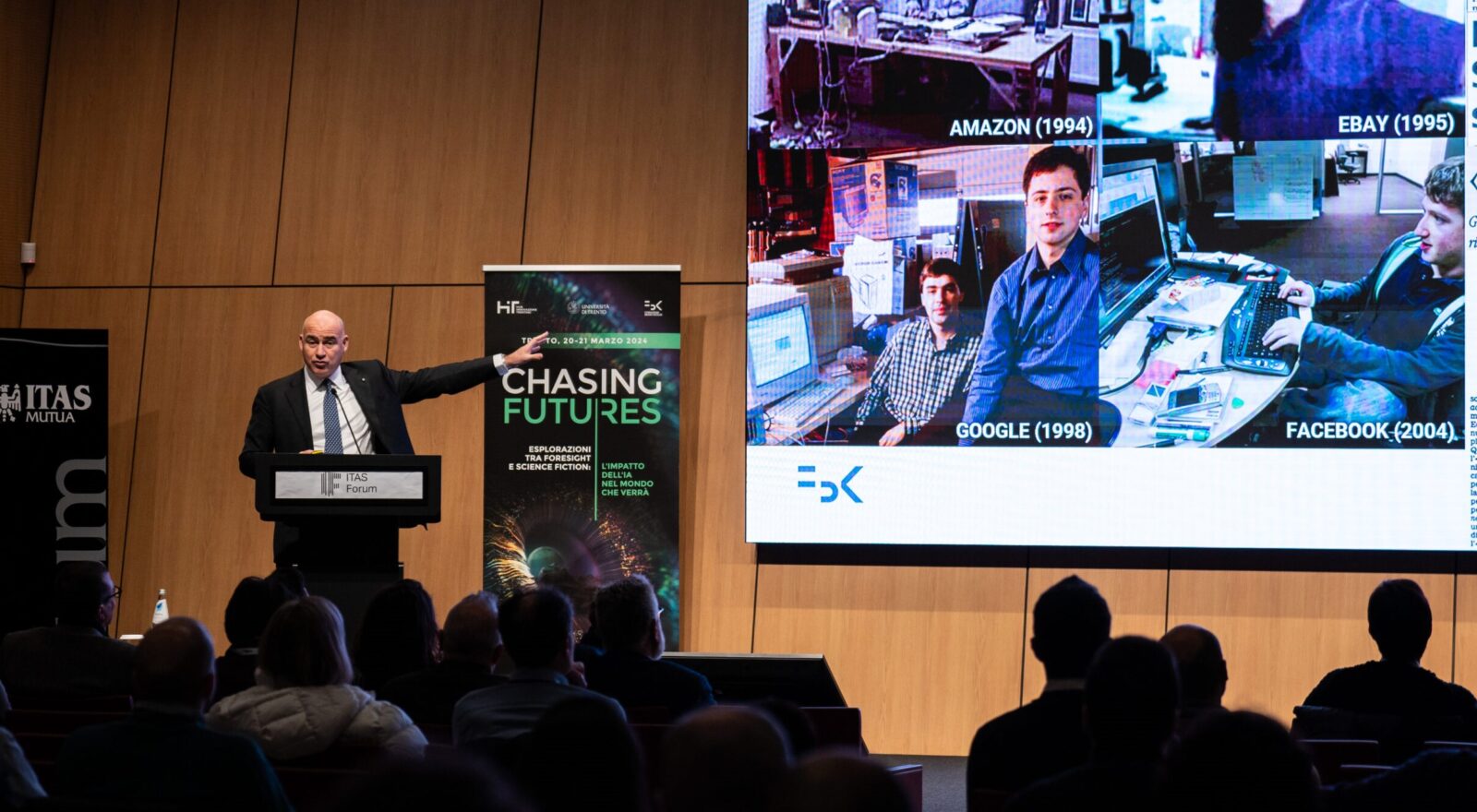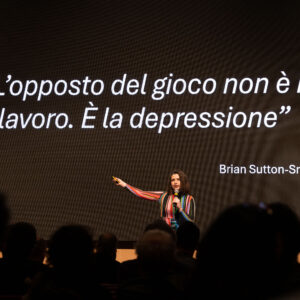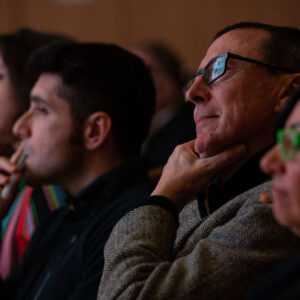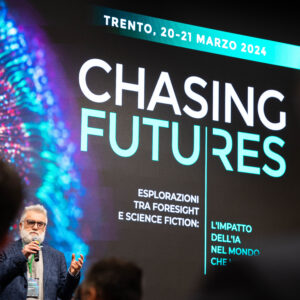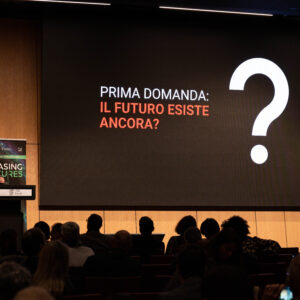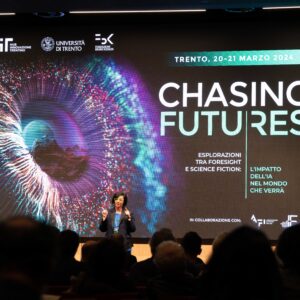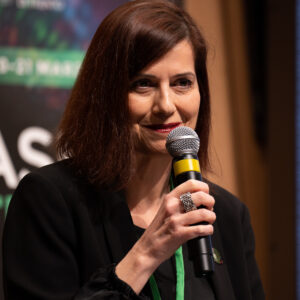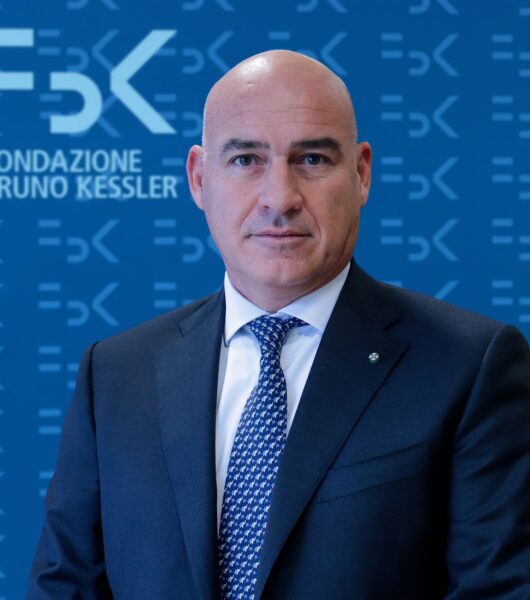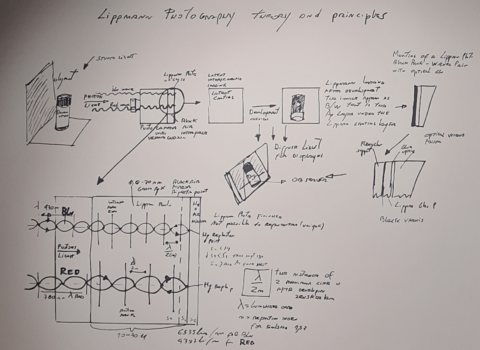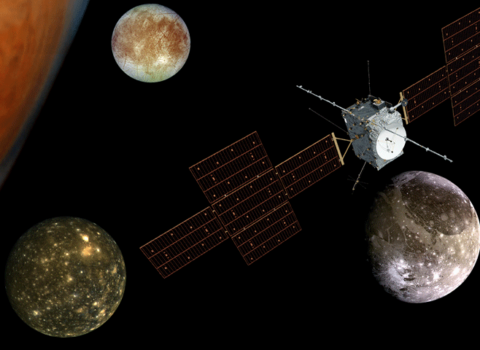
Social prediction and the impact of AI in the world to come: prevention is better than cure
The Chasing Futures event, organized by Fondazione Hub Innovazione Trentino - HIT, with the participation of FBK and the University of Trento, focused on exploring, through science fiction, the impact of artificial intelligence in the near future. With talks by President Ferruccio Resta and Paolo Traverso, Director of Strategic Planning
How do we imagine the future? What imagination shapes the world? How can we learn and train this ability? What methodologies enable us to look beyond the horizon of daily routine?
These and other questions aroused discussion on March 20 and 21, 2024 in Trento. Through films, books and expert knowledge, it was possible to engage policy makers, entrepreneurs, universities and citizens, dealing with essential issues such as health, work, sustainability, ethics, risks and opportunities of AI, which is increasingly present in our daily lives and production processes.
An interdisciplinary reflection on the impact of AI, which, through imagery, foresight and new frames of thought offered many useful insights to guide current decisions.
The 2023 film “The Creator,” directed by Gareth Edwards, opened the conference in the late afternoon of March 20, launching the topics that were discussed in depth the following day at the Itas Forum in Trento.
Mauro Gervasini, a journalist, writer, film critic and head of the film program of the Trento Film Festival, introduced the screening of the film, elaborating on the history of science fiction and cyberpunk cinematography that has characterized the last decades. The film screened imagines a future world set in the 2070s, polarized into two geographical macro-areas, whose comparative societies are opposed in their use of and relationship with AI: the West, which demonizes AI, and the East, which, on the contrary, lives harmoniously with it.
After the greetings of the Councilor for economic development, work, university, research of the Autonomous Province of Trento, Achille Spinelli, the second day was opened by Prof. Roberto Poli from the University of Trento, one of the most authoritative international experts in foresight and anticipatory systems, who for ten years has been directing the Master in Social Forecasting at the School of Sociology, with an introductory lesson on systems thinking and the interactions between the rapid geopolitical, technological and demographic changes that are intertwined in the current historical phase, giving shape to a new, datified, unstable and multipolar world, that of the 21st century, very different from the 20th century. In this context, working with the future is not only useful but becomes necessary. Therefore, not only large corporations but also institutions such as the OECD, IMF, Interpol, Red Cross and the EU have equipped themselves with specific experts that study what social changes are likely to reveal themselves in the next 10 years and beyond.
The event, sponsored by the Associazione Futuristi Italiani, the Italian Institute for the Future and the Trentino Film Commission, was attended virtually by Michelle Labeeu, Team Leader for Strategic Foresight at the European Commission’s Directorate General for International Partnerships, who emphasized that future thinking offers an opportunity to work with the biases (prejudices) existing in the present to train us to “perceive multiple possible futures.” The commonly adopted image is that of the cone of futures, whose breadth, like a spectrum of the possible, can be expanded “thanks to the method and disciplines involved in strategic foresight exercises.”
FBK President Ferruccio Resta shifted the focus from the European framework to the national situation: “in an Italian context that is struggling to match the pace of other European countries in terms of innovation, it has become urgent to reverse course. Supporting universities and research centers to develop a stronger entrepreneurial culture, attracting investors who specialize in the field, implementing efficient public regulations, promoting mentorship programs, and expanding the supply of startups by simplifying bureaucratic procedures are some of the crucial steps we need to take to create an internationally competitive ecosystem. Only through a change of mindset, attracting a critical mass of talent, a bold approach to risk-taking and foresight can we play a leading role in the future of AI. These are the indispensable prerequisites for investors to foster the development of revolutionary technologies, cutting-edge startups and successful business models.”
Keynote speaker Chen Qiufan, co-author of the book “AI 2041: Ten Visions for Our Future” together with Kai-Fu Lee, streaming from China, talked about science fiction as a training ground to discuss otherness, for opening and broadening perspectives. At the heart of his suggestion, he posed a question to the audience: “what to change to become a better species?” Under this lens, possible scenarios from the future of AI focus on human agency, i.e. the ability to act intentionally in the social context to generate change, and offer our eyes visions of futures that can be both dystopian and utopian.
Science fiction thus allows us to open our horizons and consider imaginable options not only from the fears that touch us closely in the present but also in light of as yet unseen possibilities. In the background is the great dilemma of human civilization, unable to feel united as a species, with a fragmentation between historically situated and inevitably different ethical frameworks from nation to nation, which have always tended to create divisions and wars. Speculative fiction, from its infancy, draws paths of new hope.
From cyberpunk to solarpunk, Francesco Verso, the soul and driving force behind Future Fiction and among the most translated Italian science fiction authors abroad in the past 20 years, spoke about the importance of the point of view one takes in telling the future: who tells it? “The literary biodiversity of the future is a value to be preserved because it represents the best way to keep alive and fertile the genre of science fiction-which, by definition, is concerned with telling the social and cultural transformations of tomorrow. Yet for the past 80 years, the genre has been dominated by one language, one market, one economy and lifestyle, the Anglo-Saxon one, with the consequence that one vision of the future has marginalized, data in hand, all others.” Including the ignored visions, mapping the continents of the science fiction narrative, allows us to grasp different aspects, a diversity that is richness in other sensibilities, thus discovering the beauty of the Arab, Indo, Sino, Afro and Andean futurisms. This is the sense of “vagamondare” (in Italian a pun meaning world wandering, Ed.) which already touches 35 countries through 14 languages, a heartfelt call to decolonize the future and unleash the creative potential of specific cultural legacies.
Decolonization is not limited tothe global perspective but also concerns, within each national cultural sphere, the path of the feminine in the history of moving images. Domizia De Rosa, founding member and president of Women in Film, Television & Media Italia and vice-president of Women in Film & Television International, focused on science fiction narratives from this feminist perspective in her talk. Through an excursus from Melies’ Journey to the Moon to the TV series Raised by Wolves, via Dune, Avatar and the iconic film work of Fritz Lang (author of Metropolis almost a hundred years ago and, before that, of A Woman on the Moon), she added new keys to reflection, thanks to binomials such as adaptation/de-evolution; privilege/exclusion; foresight/sustainability. In this way, the treatment of science fiction as a terrain of utopian or dystopian imagination was innervated with other current and highly relevant nuances/venues.
Thanks to the dialogue between Roberto Paura (President of the Italian Institute for the Future) and Riccardo Campa (Full Professor of Sociology at Jagiellonian University, Cracow), some perspectives on the evolution of AI penetration in our society were explored, particularly with regard to social change related to the world of work and its consequences. The discussion revealed the contribution of speculation on the future as a resource for reflecting on unfulfilled fundamental rights and inequalities affecting the present, which has long been characterized by poor and precarious work. The tension between algorithms and rights shows how artificial intelligence is changing democracies by imposing new asymmetries and dominant positions. Dystopias then help us select the futures we do not want and act as a mirror to recognize our fears and expectations more clearly.
The conference also hosted the Futurize me workshop, led by Gloria Puppi (NABA Torino, an expert in medium- to long-term scenario design): 8 working groups built pre-totypes, objects of the future placed in narrative worlds suggested by playing cards that helped build them, a fun way to put ourselves in the shoes of unexpected futures.
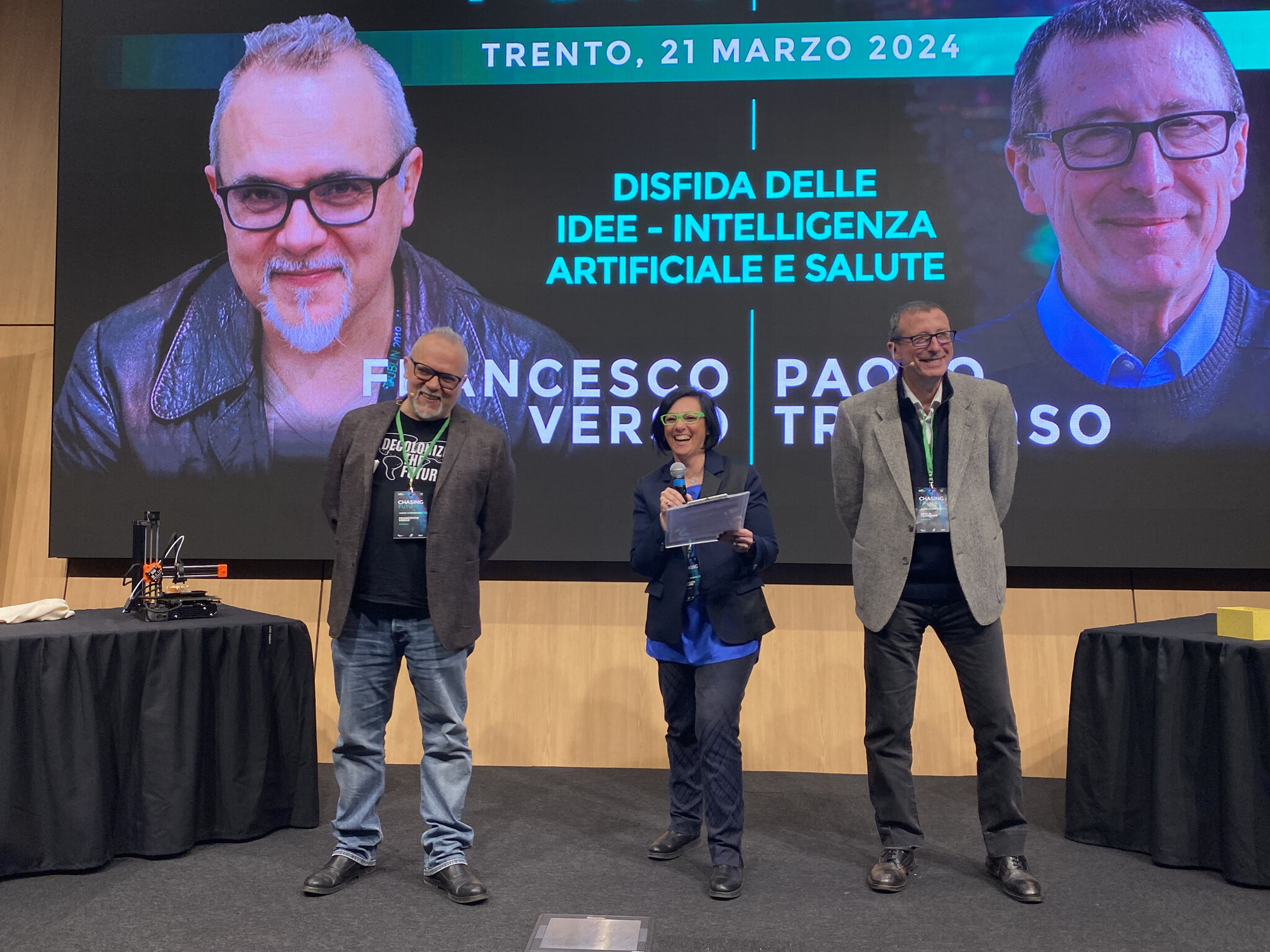
The program, moderated by Nicoletta Boldrini, journalist and popularizer, expert in futures thinking, foresight and futures studies, culminated in a crescendo that progressively “fleshed out” scenarios of the future. In the “challenge of ideas”, Francesco Verso and Paolo Traverso literally lent their bodies to stage, perform a dialogue, set in 2050, with virtual home assistants, a lunge into daily life in a possible future, engagingly showing how food, health and more might change.
Finally, in addition to the conference, a speculative design exhibit entitled “Brands of the World 2041” had been set up, inspired by seven visions of the future from Quifan’s book: curated by students from NABA in Milan, under the guidance of lecturers Giulio Bordonaro and Nicoletta Gomboli, an expert on gaming and future scenarios. In her talk, she defined gaming as a shared challenge, a “voluntary attempt to overcome unnecessary obstacles,” and showed the potential of gaming as a form of narrative of reality, “zeitgeist”. By playing games, one can, for example, collaborate in the pursuit of an important HIV genetic research result that unites the efforts of thousands of people around the world, or one can exercise one’s critical spirit on phenomena as varied as war, religion, human rights and worker exploitation. Not only that, the future itself is an invisible playground, all to be discovered.
